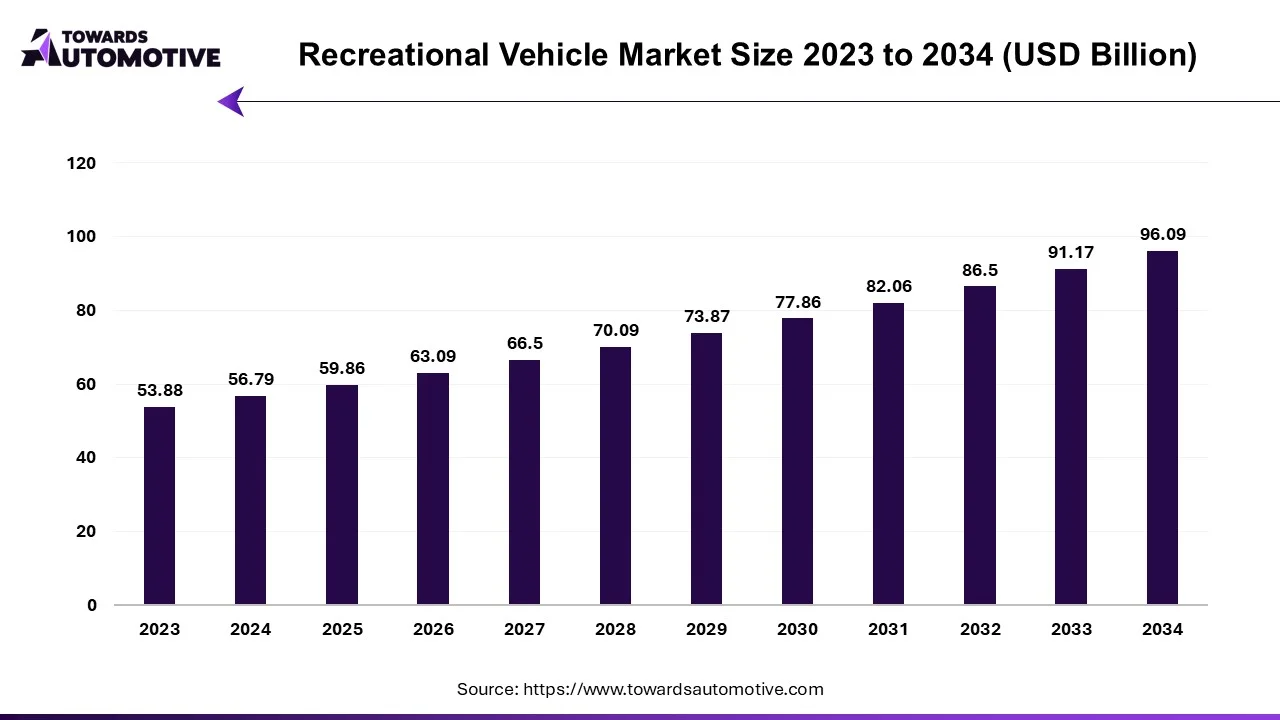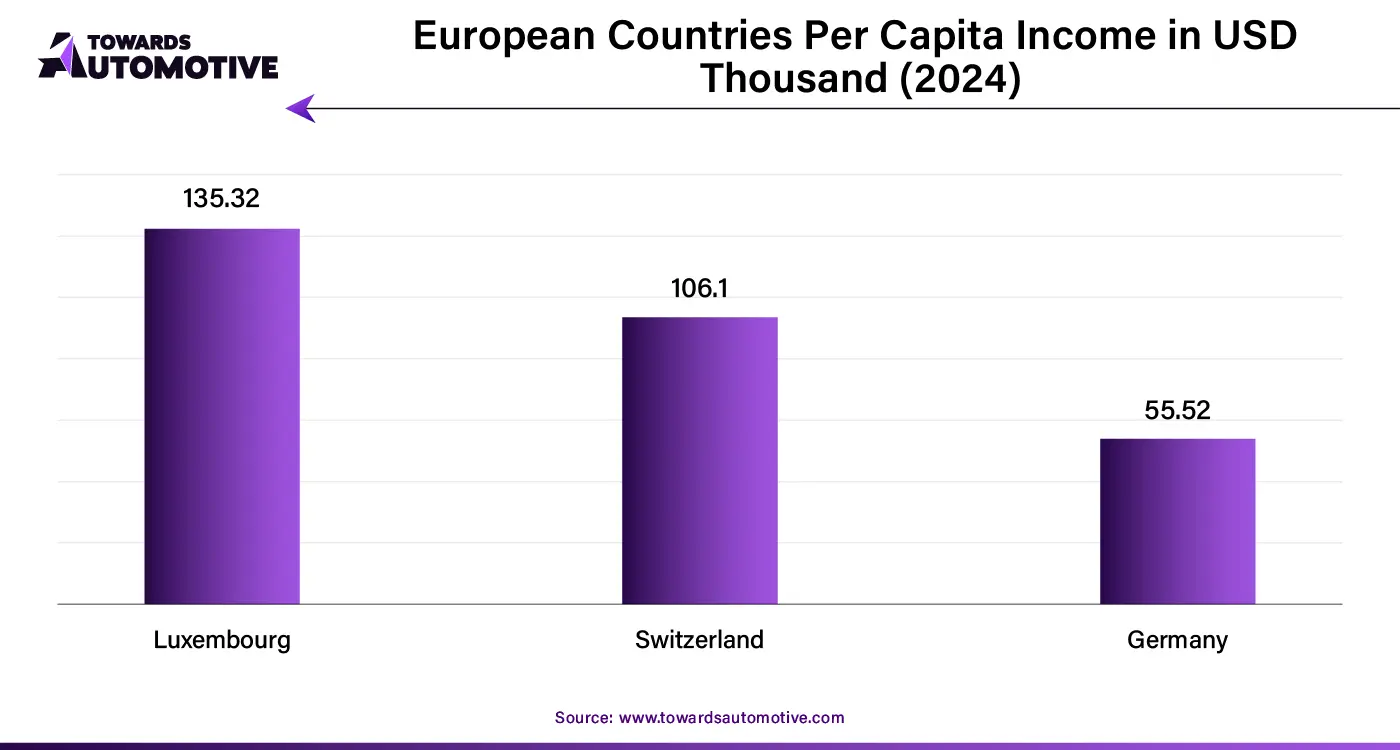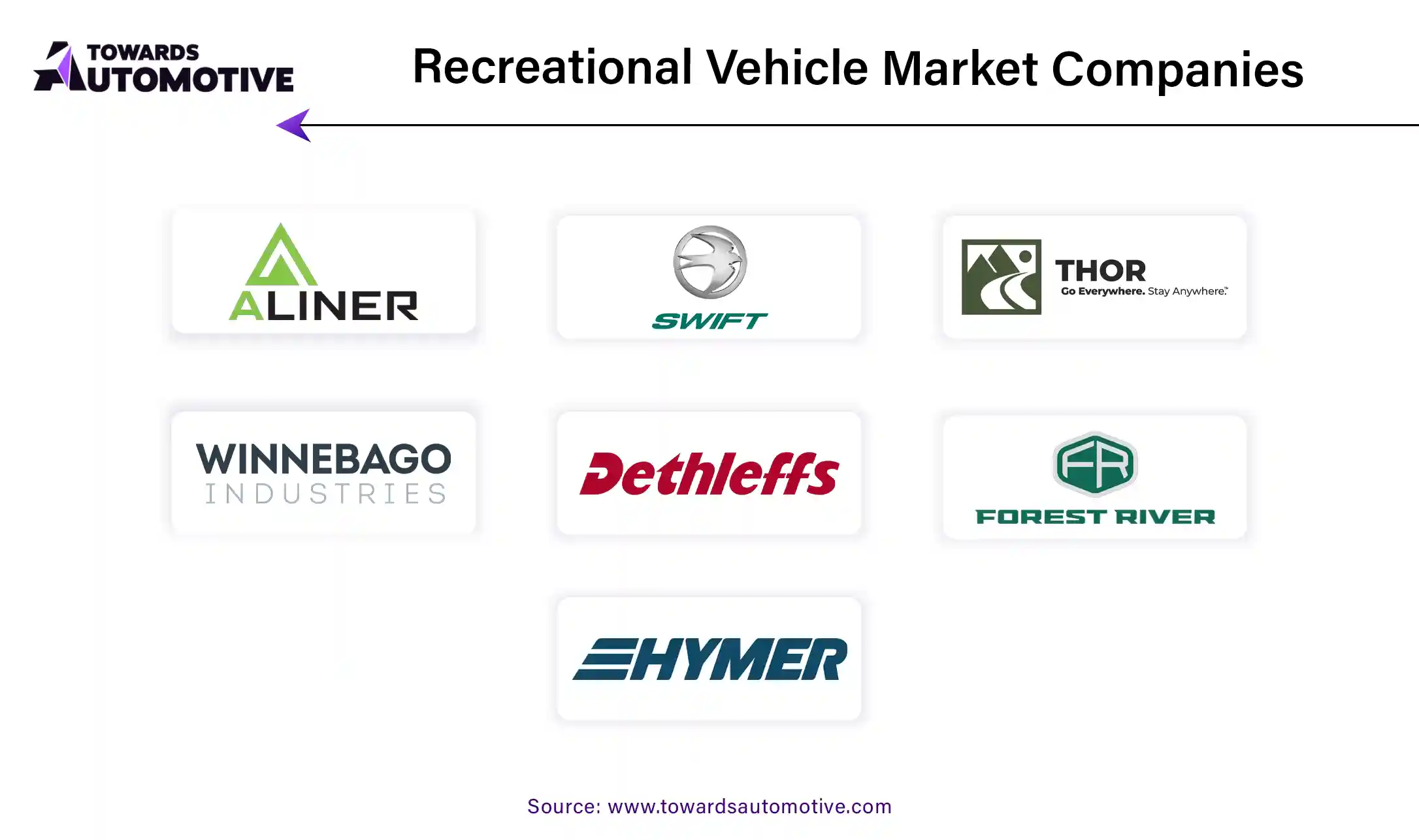April 2025

Senior Research Analyst

Reviewed By
The recreational vehicle market is forecasted to expand from USD 59.86 billion in 2025 to USD 96.09 billion by 2034, growing at a CAGR of 5.40% from 2025 to 2034.

The recreational vehicle (RV) market has emerged as a dynamic and growing industry, driven by increasing consumer interest in travel, adventure, and outdoor lifestyles. Recreational vehicles, including motorhomes, travel trailers, and campervans, offer a unique combination of mobility and comfort, enabling users to explore diverse destinations while enjoying the convenience of home-like amenities. With rising disposable incomes, changing vacation preferences, and growing awareness of sustainable travel options, the RV market is experiencing substantial growth worldwide. The appeal of RVs has expanded across a wide demographic range, from retirees seeking leisurely travel to younger generations embracing digital nomadism and remote work opportunities.
Technological advancements have played a pivotal role in the evolution of the RV market, with modern vehicles featuring smart connectivity, energy-efficient systems, and innovative designs. Features such as solar panels, enhanced safety systems, and advanced navigation tools have made RVs more appealing and accessible to a broader audience. The growing popularity of off-grid and eco-friendly travel has also boosted demand for RVs equipped with sustainable and energy-efficient technologies. Additionally, the rise of peer-to-peer RV rental platforms has made it easier for consumers to experience RV travel without ownership, further expanding market reach.
In regions such as North America, Europe, and Asia-Pacific, government initiatives supporting tourism and infrastructure improvements have provided a favorable environment for the RV market. Emerging trends, such as luxury RVs and customizable interior designs, cater to evolving consumer preferences, creating new opportunities for market growth. As travel and lifestyle trends continue to shift toward flexibility and personalization, the recreational vehicle market is poised for continued expansion, shaping the future of tourism and leisure.
AI plays a transformative role in the recreational vehicle (RV) market, revolutionizing various aspects of design, manufacturing, maintenance, and customer experience. One of its most impactful applications is in the development of smart RVs equipped with advanced features that enhance convenience, safety, and energy efficiency. AI-driven systems enable real-time monitoring and control of key RV functions, such as climate control, lighting, and security, through mobile apps or voice-activated assistants. These smart features appeal to tech-savvy consumers, making RVs more user-friendly and aligning with modern travel preferences.
In manufacturing, AI optimizes production processes by leveraging predictive analytics and machine learning to streamline operations, reduce waste, and improve quality. AI-powered tools assist in designing RV interiors that maximize space and functionality, while also enabling manufacturers to incorporate customizable features that cater to individual consumer needs. This level of personalization is becoming increasingly important in attracting a broader audience to the RV market.
AI also enhances maintenance and after-sales services. Predictive maintenance systems, powered by AI, can monitor vehicle health, detect potential issues, and provide timely alerts to owners, minimizing downtime and repair costs. These systems not only improve reliability but also increase consumer trust in RV brands.
For RV dealerships and rental platforms, AI-driven tools are improving customer engagement and decision-making. Recommendation algorithms analyze user preferences and behaviors to suggest suitable RV models or travel packages, enhancing the overall customer experience. Additionally, AI-powered chatbots and virtual assistants streamline customer support, providing instant solutions and guidance.
By integrating AI into design, functionality, and customer engagement, the RV market is positioned to meet evolving consumer demands while driving innovation and efficiency, solidifying AI's role as a catalyst for growth and modernization in the industry.
The growing development in the tourism sector is a significant driver of growth in the recreational vehicle (RV) market, as more travelers seek flexible, cost-effective, and unique ways to explore new destinations. As the global tourism industry rebounds and expands, the demand for RVs has surged, particularly among individuals and families who prefer road trips and outdoor adventures. The ability to travel at one's own pace, without the limitations of traditional accommodations, has made RVs an attractive choice for those seeking a personalized and immersive travel experience.
Additionally, the rise of eco-tourism and nature-based tourism has further contributed to this growth, as RVs provide an ideal mode of transportation for exploring remote or off-the-beaten-path locations. The convenience of having both transportation and lodging in one vehicle appeals to tourists who want to visit national parks, coastal areas, and other natural attractions while maintaining comfort and privacy.
The tourism industry's increasing focus on road-based travel, coupled with rising interest in camping and outdoor recreational activities, has driven manufacturers to innovate with RVs that cater to diverse consumer needs. From compact, fuel-efficient models to luxurious, fully-equipped motorhomes, the range of available RV options ensures there is something for every type of traveler. These factors, combined with the continued expansion of tourism infrastructure, make the tourism sector a key catalyst for growth in the RV market.
The recreational vehicle (RV) market faces several restraints that hinder its growth, including high initial purchase costs and maintenance expenses, which can deter price-sensitive consumers. Additionally, fluctuating fuel prices impact the affordability of RV travel, limiting adoption among budget-conscious buyers. The need for specialized storage spaces and parking, along with the challenges of navigating large vehicles, further restrict market expansion. Moreover, environmental concerns and regulations around emissions pose challenges for traditional fuel-powered RVs, driving the need for sustainable alternatives.
The emergence of electric recreational vehicles (RVs) is creating significant opportunities in the recreational vehicle market by addressing growing consumer demand for sustainable and eco-friendly travel options. Electric RVs, powered by advanced battery technologies, offer a greener alternative to traditional fuel-powered models, reducing carbon emissions and operating costs. As environmental awareness rises and government regulations surrounding emissions tighten, the shift towards electric RVs is becoming a pivotal trend, driving innovation and market growth.
One of the key opportunities lies in the technological advancements in battery capacity and charging infrastructure. Modern electric RVs can travel longer distances on a single charge, making them increasingly viable for extended road trips. Additionally, the expansion of EV charging networks across highways and remote locations supports the widespread adoption of electric RVs, ensuring convenient recharging during travels.
Electric RVs also appeal to tech-savvy and environmentally conscious consumers who prioritize sustainability without compromising on comfort and convenience. Manufacturers are integrating smart features, such as energy-efficient appliances, solar panel systems, and advanced connectivity solutions, further enhancing their appeal.
Moreover, the lower operational costs of electric RVs, combined with potential incentives and tax benefits offered by governments for EV adoption, make them a cost-effective option over time. These factors collectively position electric RVs as a transformative innovation, creating substantial growth opportunities within the recreational vehicle market.
The towable RVs segment held a dominant share of the market. Towable recreational vehicles (RVs) play a significant role in driving the growth of the recreational vehicle market due to their affordability, versatility, and wide appeal among diverse consumer groups. Unlike motorized RVs, towable RVs, such as travel trailers, fifth wheels, and pop-up campers, offer a cost-effective entry point for first-time buyers and outdoor enthusiasts. Their lower initial investment, combined with the ability to use a standard vehicle for towing, makes them an attractive choice for budget-conscious travelers seeking flexibility in their travel experiences.
The lightweight and compact design of many towable RVs also makes them suitable for a variety of vehicles, including SUVs and pickup trucks, which are increasingly popular among consumers. This compatibility expands the potential customer base, especially in regions where these vehicles are prevalent. Additionally, towable RVs allow users to disconnect the RV at campsites, freeing up the towing vehicle for other activities, which adds to their convenience and appeal.
Towable RVs are also driving market growth due to their ability to cater to a wide range of consumer preferences. Manufacturers offer diverse layouts, features, and price points, ensuring there is a model for every type of travelers ranging from families seeking spacious interiors to couples or solo adventurers looking for compact and minimalist designs. Technological advancements such as lightweight materials and energy-efficient appliances, have further enhanced the appeal of towable RVs by improving fuel efficiency and overall usability.
Moreover, the rise in outdoor tourism and camping culture has fueled demand for towable RVs as they provide a comfortable and mobile way to explore nature. Their affordability, ease of use, and flexibility make them a preferred choice for many consumers, positioning the segment as a key driver of growth within the broader recreational vehicle market.
The personal segment led the industry. The personal segment significantly drives the growth of the recreational vehicle (RV) market by catering to the increasing demand for customized and flexible travel experiences among individual consumers and families. This segment primarily includes RVs purchased for personal use, offering owners the freedom to explore destinations at their convenience, without reliance on hotels or rigid travel schedules. The growing preference for road trips, camping, and adventure travel has led to a surge in personal RV ownership, especially among millennials and families looking for unique and cost-effective vacation options.
One of the key factors fueling this growth is the rising trend of "staycations" and domestic travel. In regions with scenic landscapes and extensive road networks, personal RVs enable consumers to explore local destinations while maintaining comfort and convenience. The ability to travel with personalized amenities, such as kitchens, sleeping areas, and entertainment systems, adds to the appeal of RV ownership.
Advancements in RV technology, such as energy-efficient appliances, smart connectivity, and improved fuel efficiency, have further enhanced the attractiveness of RVs for personal use. These innovations address consumer demand for eco-friendly and tech-enabled travel options, aligning with modern lifestyles.
The affordability of entry-level RV models and the availability of financing options also contribute to the growth of this segment, making personal RV ownership accessible to a broader audience. Furthermore, the rise of remote work has enabled individuals to use RVs for extended travel while staying connected, expanding their appeal beyond leisure to include work-life flexibility. As a result, the personal segment continues to play a pivotal role in the expansion of the recreational vehicle market.
North America dominated the recreational vehicle market. The recreational vehicle (RV) market in North America is witnessing robust growth, driven by several key factors, including evolving consumer lifestyles, advancements in RV technology, and a thriving tourism sector. The region's cultural emphasis on road trips, outdoor adventures, and flexible travel has positioned RVs as an ideal solution for consumers seeking comfort, mobility, and convenience. Rising disposable incomes and the growing popularity of experiential travel among families, retirees, and younger generations contribute significantly to the market's expansion.
One of the primary growth drivers is the increasing adoption of RVs among millennials and Gen Z consumers. These demographics are embracing RVs for weekend getaways, extended vacations, and even remote work, fueled by the rise of the digital nomad lifestyle. The COVID-19 pandemic also played a pivotal role in reshaping travel preferences, with many North Americans opting for RVs to explore domestic destinations while maintaining safety and social distancing.
Technological advancements in RVs, such as smart connectivity, solar-powered systems, and lightweight materials, are enhancing functionality and sustainability, appealing to environmentally conscious consumers. Additionally, the availability of a diverse range of RVs, from luxury motorhomes to compact campervans, ensures that manufacturers cater to varied budgets and preferences.
Government initiatives supporting tourism and the development of RV-friendly infrastructure, such as campgrounds and charging stations, further bolster the market. The expansion of peer-to-peer RV rental platforms, offering affordable and flexible options for non-owners, is also driving growth. Moreover, the rise of eco-tourism and off-grid travel trends is encouraging the adoption of RVs equipped with energy-efficient and sustainable technologies.
With its rich natural landscapes, strong cultural affinity for road travel, and continued innovation, the North American RV market is poised for sustained growth, meeting the demands of an increasingly diverse and adventurous consumer base.
Europe is expected to grow with the highest CAGR during the forecast period. The recreational vehicle (RV) market in Europe is driven by several key factors, reflecting evolving consumer trends, advancements in technology, and supportive infrastructure. A major driver is the increasing preference for personalized and flexible travel experiences. Travelers in Europe are seeking alternatives to traditional tourism, and RVs offer a convenient way to explore diverse landscapes, historical sites, and cultural attractions at their own pace. This shift in travel behavior has positioned RVs as an attractive option for both short getaways and extended vacations.
Sustainability and eco-conscious travel are also significant drivers. With a growing focus on reducing environmental impact, consumers are opting for RVs equipped with eco-friendly technologies such as solar panels, hybrid engines, and electric drivetrains. These trends align with Europe’s broader environmental goals and government incentives promoting green mobility, which further support the RV market.
The region's strong infrastructure, including an extensive network of campgrounds and caravan parks, is another driving force. Europe’s well-developed camping facilities make RV travel convenient and accessible, encouraging more consumers to adopt this mode of tourism. Additionally, investments in expanding and upgrading these facilities enhance the overall RV travel experience.
Technological advancements in RV manufacturing, such as lightweight materials, smart connectivity features, and improved fuel efficiency, have also boosted demand. These innovations cater to younger demographics, including millennials and Gen Z, who are increasingly adopting RVs for road trips, remote work, and adventure travel.
Economic factors, such as rising disposable incomes and the affordability of RV rentals through peer-to-peer platforms, further contribute to market growth. The pandemic has also played a role by accelerating interest in domestic and socially distanced travel options, making RVs an appealing choice for safety-conscious travelers.


By Vehicle Type
By Application
By Region
April 2025
March 2025
March 2025
March 2025
Dr. Arjun Patel is a distinguished expert in the automotive industry, holding advanced degrees in Automotive Engineering and Mechanical Engineering. His expertise spans automotive market dynamics, technological advancements, and sustainable practices. Dr. Patel excels in conducting in depth research and analysis on market trends, consumer preferences, and the economic implications within the automotive sector. He is renowned for his insightful publications on topics such as electric vehicles, autonomous driving technologies, and the evolution of sustainable transportation solutions. Dr. Patels research contributions have significantly advanced understanding in the field, earning him recognition as a leading authority in automotive research and analysis.
We offer automotive expertise for market projections and customizable research, adaptable to diverse strategic approaches.
Contact Us